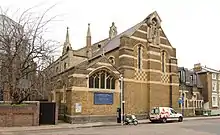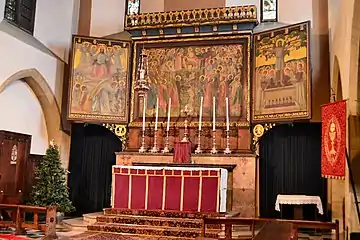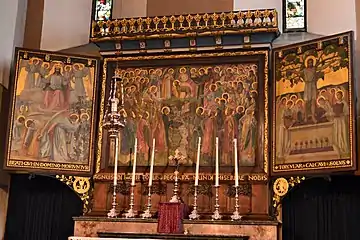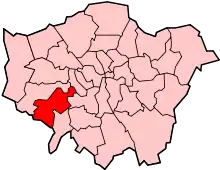| St John the Divine, Richmond | |
|---|---|
 St John the Divine from St John's Road, Richmond | |
| 51°27′51″N 0°18′01″W / 51.4642°N 0.3003°W | |
| Location | Richmond, London |
| Country | England |
| Denomination | Church of England |
| Website | www |
| History | |
| Founded | 1831 |
| Associated people | Vigo Auguste Demant (vicar from 1933 to 1942) |
| Architecture | |
| Architect(s) | Lewis Vulliamy (original building); Arthur Grove (later additions and church hall) |
| Style | Early Gothic revival |
| Completed | 1836 |
| Administration | |
| Province | Canterbury |
| Diocese | Southwark |
| Episcopal area | Kingston |
| Archdeaconry | Wandsworth |
| Deanery | Richmond & Barnes |
| Parish | St John the Divine, Richmond |
| Clergy | |
| Archbishop | Justin Welby |
| Bishop(s) | Christopher Chessun |
| Vicar(s) | Neil Summers[1] |
| Laity | |
| Reader(s) |
|
| Parish administrator | Liz Roberts[2] |
Listed Building – Grade II | |
| Official name | Church of St John the Divine |
| Designated | 10 January 1950 |
| Reference no. | 1194182 |
St John the Divine, Richmond, in the Anglican Diocese of Southwark, is a Grade II listed church[3] on Kew Road, in Richmond, London, near Richmond railway station. Built in 1836, and a parish in its own right since 1838, it was designed by Lewis Vulliamy[4] in the Early Gothic Revival architectural style.[3]
Since 1996 St John the Divine has been part of the Richmond Team Ministry, which also includes the churches of St Mary Magdalene and St Matthias.[5][6]
History
Richmond grew rapidly during the 18th and early 19th centuries.[7] By the 1820s, Richmond's original parish church, St Mary Magdalene, was too small.,[8] quoted in Brown, Ingrid (10 September 2011). "St.Matthias' Church and the Medievalism of Sir George Gilbert Scott". The Victoria Web. Retrieved 16 April 2015.</ref> Having recognised the need for another chapel, the vestry commissioned new construction by 1831. The new building, St John the Divine, was completed in 1836.,[9] quoted in Brown, Ingrid (10 September 2011). "St.Matthias' Church and the Medievalism of Sir George Gilbert Scott". The Victoria Web. Retrieved 16 April 2015.</ref> It was built from 1831 to 1836 on a site provided by local resident and landowner, William Selwyn (1775–1855); the architect was Lewis Vulliamy. Bridget Cherry and Nikolaus Pevsner criticise Vulliamy's "craziest W spire and senseless flying buttresses from the W porches up to the nave" but describe Grove's east end (added in the early 20th century) as "a fine composition".[4]
In 1838 it became a parish church in its own right.[10]
Organ
The organ, built by Beale and Thynne, was dedicated in December 1896.[11] Described as "a virtually unaltered work of Victorian artistry", it has been fully restored.[12]
20th-century additions
A chancel, south chapel and vestries were added in 1904–1905; they were designed by Arthur Grove.[4] In 1908, Nathaniel Westlake painted the sanctuary ceiling with illustrations of the Book of Revelation, chapter 14, and created the triptych behind the altar.[4][11] Westlake also painted the Stations of the Cross, which are now missing; they were replaced between 1955 and 1970 by reliefs in Nabresina stone carved by Freda Skinner.[4] Eric Gill carved the stonework on the triptych and over the sacristy door.[11][13] The Calvary sculpture on the east end facing St John's Road was carved by Richard Garbe.[14]
The church hall, in brick, was built in 1911.[4]
In 1980–1981 adaptations were made to the church to enable it be used occasionally for concerts and to provide a meeting room, toilet facilities and residential accommodation.[15] The architects were Dry Hastwell Butlin Bicknell,[4] a partnership of David Dry (1934–2011), Vince Hastwell, George Butlin and Roger Bicknell.[16]
21st-century restoration
The reredos in the Lady Chapel was restored in the early 21st century by Howell and Bellion.[17]
People
Vigo Auguste Demant (1893–1983), vicar at St John the Divine from 1933 to 1942, became a Canon of St Paul's Cathedral and an Oxford University professor. A regular broadcaster on the BBC's Third Programme in the 1950s,[18] he served on the committee that produced the 1957 Wolfenden report which recommended that "homosexual behaviour between consenting adults in private should no longer be a criminal offence".[19]
Worship
The church's style of worship is described as "modern/liberal Catholic".[20] Eucharist is celebrated at 11.00 am on Sundays and 7:00 pm on Tuesdays.[21]
Photo gallery
 The West façade of the church
The West façade of the church The spire viewed from above the trees
The spire viewed from above the trees The Sanctuary
The Sanctuary The Triptych by Nathaniel Westlake
The Triptych by Nathaniel Westlake The chancel ceiling by Westlake
The chancel ceiling by Westlake.jpg.webp) Interior view
Interior view
 The recently restored Lady Chapel, restored in the 21st century
The recently restored Lady Chapel, restored in the 21st century Calvary sculpture on the East end exterior by Richard Garbe (1876–1957)
Calvary sculpture on the East end exterior by Richard Garbe (1876–1957) Stations of the Cross by Freda Skinner
Stations of the Cross by Freda Skinner
References
- 1 2 "Meet the team". Richmond Team Ministry. Retrieved 13 December 2015.
- ↑ "Contact Us". Richmond Team Ministry. Retrieved 14 September 2016.
- 1 2 Historic England (10 January 1950). "Church of St John the Divine (1194182)". National Heritage List for England. Retrieved 14 September 2016.
- 1 2 3 4 5 6 7 Cherry, Bridget and Pevsner, Nicolaus (1983). The Buildings of England – London 2: South. London: Penguin Books. p. 517. ISBN 0-14-0710-47-7.
{{cite book}}: CS1 maint: multiple names: authors list (link) - ↑ "Our churches". Richmond Team Ministry. Retrieved 2 March 2016.
- ↑ "History of Richmond Team Ministry". Richmond Team Ministry. Retrieved 3 March 2016.
- ↑ Cloake, John (1991). Richmond Past: A Visual History of Richmond, Kew, Petersham and Ham. London: Historical Publications. p. 69. ISBN 0-948667-14-1.
- ↑ Cloake, John (7 August 1987). "Richmond Parish Church: Richmond Retrospect". Richmond and Twickenham Times.
- ↑ Cloake, John (1991). Richmond Past: A Visual History of Richmond, Kew, Petersham and Ham. London: Historical Publications. p. 92. ISBN 0-948667-14-1.
- ↑ Velluet, Paul (2008). St Matthias' Church, Richmond: A Guide and History. The Friends of St. Matthias.
- 1 2 3 "History of St John the Divine". Richmond Team Ministry. Retrieved 19 January 2013.
- ↑ Bundy, Michael (July 1993). "The Beale and Thynne Organ in St John the Divine, Richmond". BIOS Reporter. British Institute of Organ Studies. XVII (3). Archived from the original on 4 January 2014. Retrieved 9 May 2015.
- ↑ Cave, Leonard (1997). "Eric Gill in Richmond and Kingston". Richmond History. 18: 3–6.
- ↑ Bunnage, Paul; Barr, Alyson (2017). St John the Divine: A brief Guide to the Church.
- ↑ "Richmond & Barnes Deanery; Richmond, St John the Divine". Diocese of Southwark. Retrieved 19 January 2013.
- ↑ "Past Masters – Obituary: David Dry 1934–2011". RIBA Journal: 20. September 2011. Retrieved 19 June 2017.
- ↑ "St John-the-Divine, Richmond, Diocese of Southwark". The Ecclesiological Society.
- ↑ "Religion: Will Civilization Survive?". Time Magazine. 10 July 1950. Archived from the original on 21 October 2012. Retrieved 20 January 2013.
- ↑ Report of the Committee on Homosexual Offences and Prostitution (1957). London: Her Majesty's Stationery Office.
- ↑ "Theology". St John the Divine. Richmond Team Ministry. Retrieved 13 August 2015.
- ↑ "Welcome to St John the Divine". St John the Divine. Richmond Team Ministry. Retrieved 13 August 2015.

